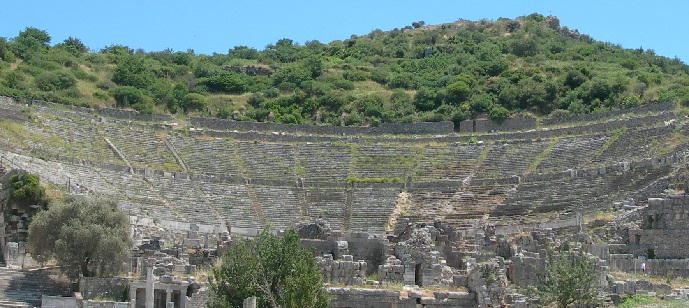Ephesus Theatre
Ephesus Theatre

Theatre of Ephesus
The original theatre of Ephesus was dug into the side of Mount Panayir, which is more a hill than a mountain, in the 3rd century BC. In the early first century AD, the Romans expanded that theatre into the massive Great Theatre of Ephesus ("Ephesus Theatre") above.
With a seating capacity of 25,000, Ephesus Theatre was the largest theatre in Asia Minor, which is roughly today's Turkey. Despite its size, large even by today's standard, Ephesus Theatre neither had nor needed a sound system, thanks to the breeze from Cayster River, originally just a half mile away, that carried voices and music from the stage up the sixty rows of seats.
Built from stone, including marble, Ephesus Theatre was an all-purpose venue for plays, concerts, public debates, even gladiator battles, and was used until the 5th century AD, when it was damaged by an earthquake. After that, it was used sparingly but is still sturdy enough for Sting to have held a rock concert in it in 1993, as the locals still boast about.
Worthy of less pride is what took place in it some 1,900 years ago, when Demetrius and his fellow silversmiths, angry over declining sales of their miniature copies of the Temple of Diana, positioned their economic woes as a religious grievance against the apostle Paul and his friends:
So the whole city was filled with confusion, and rushed into the theater with one accord, having seized Gaius and Aristarchus, Macedonians, Paul’s travel companions. And when Paul wanted to go in to the people, the disciples would not allow him. Then some of the officials of Asia, who were his friends, sent to him pleading that he would not venture into the theater. Some therefore cried one thing and some another, for the assembly was confused, and most of them did not know why they had come together. And they drew Alexander out of the multitude, the Jews putting him forward. And Alexander motioned with his hand, and wanted to make his defense to the people. But when they found out that he was a Jew, all with one voice cried out for about two hours, “Great is Diana of the Ephesians!” And when the city clerk had quieted the crowd, he said: “Men of Ephesus, what man is there who does not know that the city of the Ephesians is temple guardian of the great goddess Diana, and of the image which fell down from Zeus? Therefore, since these things cannot be denied, you ought to be quiet and do nothing rashly. For you have brought these men here who are neither robbers of temples nor blasphemers of your goddess. Therefore, if Demetrius and his fellow craftsmen have a case against anyone, the courts are open and there are proconsuls. Let them bring charges against one another. But if you have any other inquiry to make, it shall be determined in the lawful assembly. For we are in danger of being called in question for today’s uproar, there being no reason which we may give to account for this disorderly gathering.” And when he had said these things, he dismissed the assembly. (Acts 19:29-41)
The Bible says Paul left the city after this incident to proclaim elsewhere why Jesus died and rose from the dead, and eventually issued a stern warning to Ephesus' church.